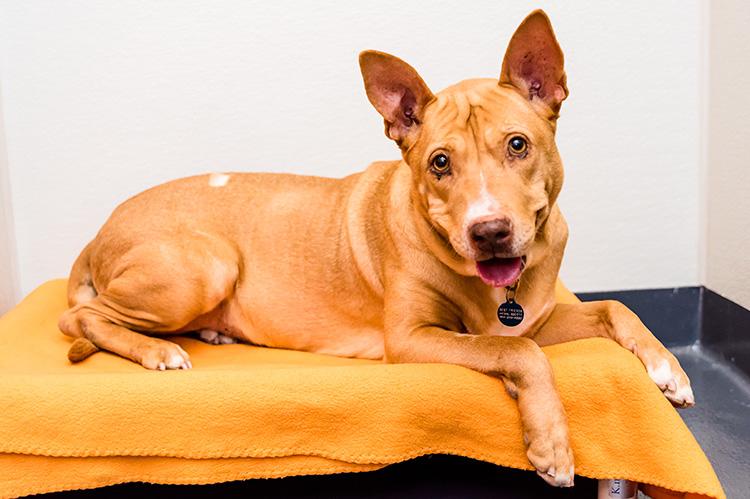Urinary Incontinence in Dogs: Signs, Causes, Treatments

Wondering why your dog is suddenly peeing indoors? Many dogs have urinary incontinence, which means they leak urine involuntarily. This is different from dog marking, excited peeing, and other inappropriate urination — when a dog urinates intentionally in places where they're not supposed to or at times when they're not able to make it outside. Dogs with urinary incontinence truly can't control leaking urine.
Here are some signs of urinary incontinence in dogs, plus the common causes and treatments for canine incontinence.
Signs of urinary incontinence in dogs
Have you found a puddle of pee or damp bedding in spots where your dog has been lying down? This is a telltale sign of canine urinary incontinence, but it still should be diagnosed by a veterinarian because there are other potential health issues that can cause this as well.
If you suspect that your dog has urinary incontinence, it is a good idea to write down the details of what you have been noticing and make an appointment with your vet. To give your vet the most information and the best opportunity to help your dog, record the following:
- When and where you are finding urine
- When the problem started and whether it is getting better or worse
- Whether your dog needs to go outside more frequently
- Whether you have noticed frequent or painful urination outside
- Whether your dog is drinking more water than usual
- Whether anything else about the health of your dog has changed
These observations will help your veterinarian determine whether urinary incontinence is likely. Sometimes, a urinary tract infection — or any number of diseases that cause a dog to drink and urinate more — can present symptoms similar to urinary incontinence. For this reason, your veterinarian will do a complete physical exam and is likely to run blood and urine tests. If you can, bring a fresh sample of urine from your dog to the appointment.
Common causes and treatments of dog incontinence
Let’s take a closer look at some of the common causes of urinary incontinence in dogs.
Ectopic ureters: If your puppy is leaking urine, it might be due to ectopic ureters. The ureters carry urine from the kidneys to the bladder. Occasionally, the ureters bypass the bladder and connect farther down, which causes urine to constantly leak. Special imaging with contrast can diagnose ectopic ureters, and surgery can reposition the ureters in their proper place.
Nerve damage: Urinary incontinence can develop if the nerves that control the bladder aren’t able to deliver their signals. For example, a dachshund who suffers a back injury and is unable to move her back legs or tail will be unable to empty her bladder. If the bladder gets too big, it will overflow and leak urine onto bedding. A urinary catheter can be used in the hospital to remove urine from the bladder, but people can learn to express their dog’s bladder at home as well.
Urethral sphincter mechanism insufficiency (USMI): This is the most common cause of urinary incontinence in dogs. USMI basically means that the urethral sphincter is not strong enough to retain urine, so leaking develops. Many factors contribute to this, including estrogen deficiency, obesity, and genetic predisposition. The good news is that USMI is generally treated easily with longterm medication. Medications that can treat USMI include:
- Phenylpropanolamine (PPA) is a medication that strengthens the urethral sphincter. It is generally given twice a day, and most dogs respond very well. PPA can increase heart rate and blood pressure, so your veterinarian might recommend periodic monitoring. It can also cause restlessness and anxiety, so keep a look out when your dog starts this medication.
- Estrogen supplementation, including Incurin and DES. These medications provide a very low dose of estrogen to increase urethral tone and relieve urinary incontinence in many dogs.
- Testosterone might be given to male dogs with urinary incontinence.
After your dog is diagnosed with urinary incontinence and started on treatment, it is important to continue to monitor urination. Medications often need to be adjusted over time, and sometimes a combination of medications can be more helpful than one on its own.
Please be aware that dogs with urinary incontinence can be more likely to get bladder infections. In fact, a bladder infection can worsen signs of urinary incontinence. So let your veterinarian know if your dog suddenly starts leaking more or has other signs of a bladder infection.
On the upside, the vast majority of dogs with urinary incontinence lead normal lives with just a little help from their people and veterinarians.